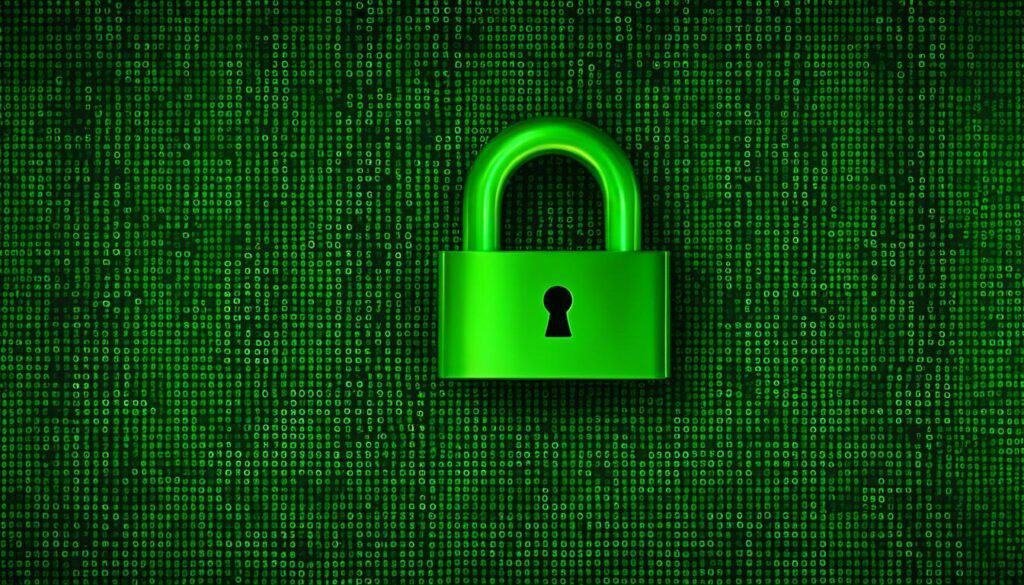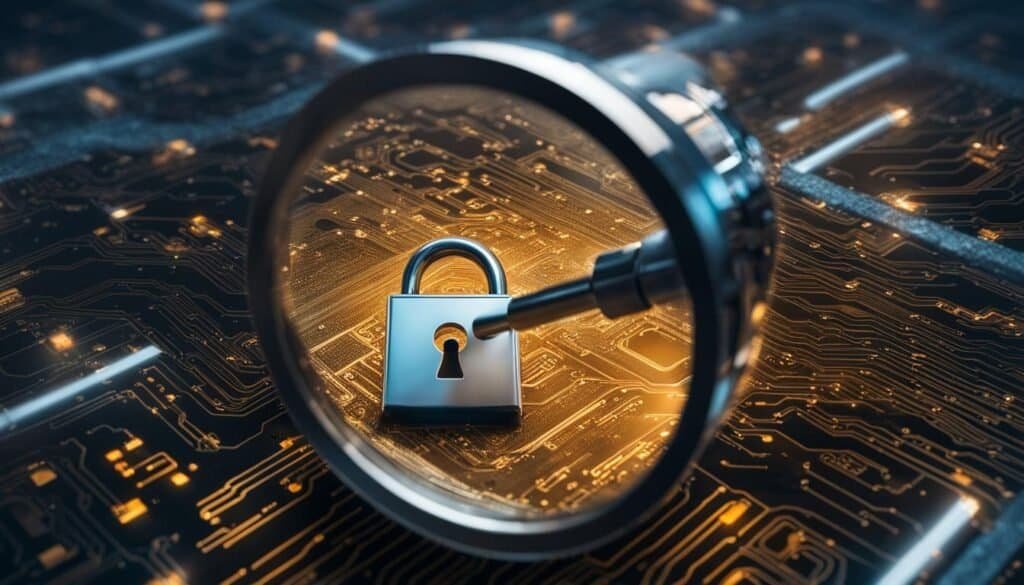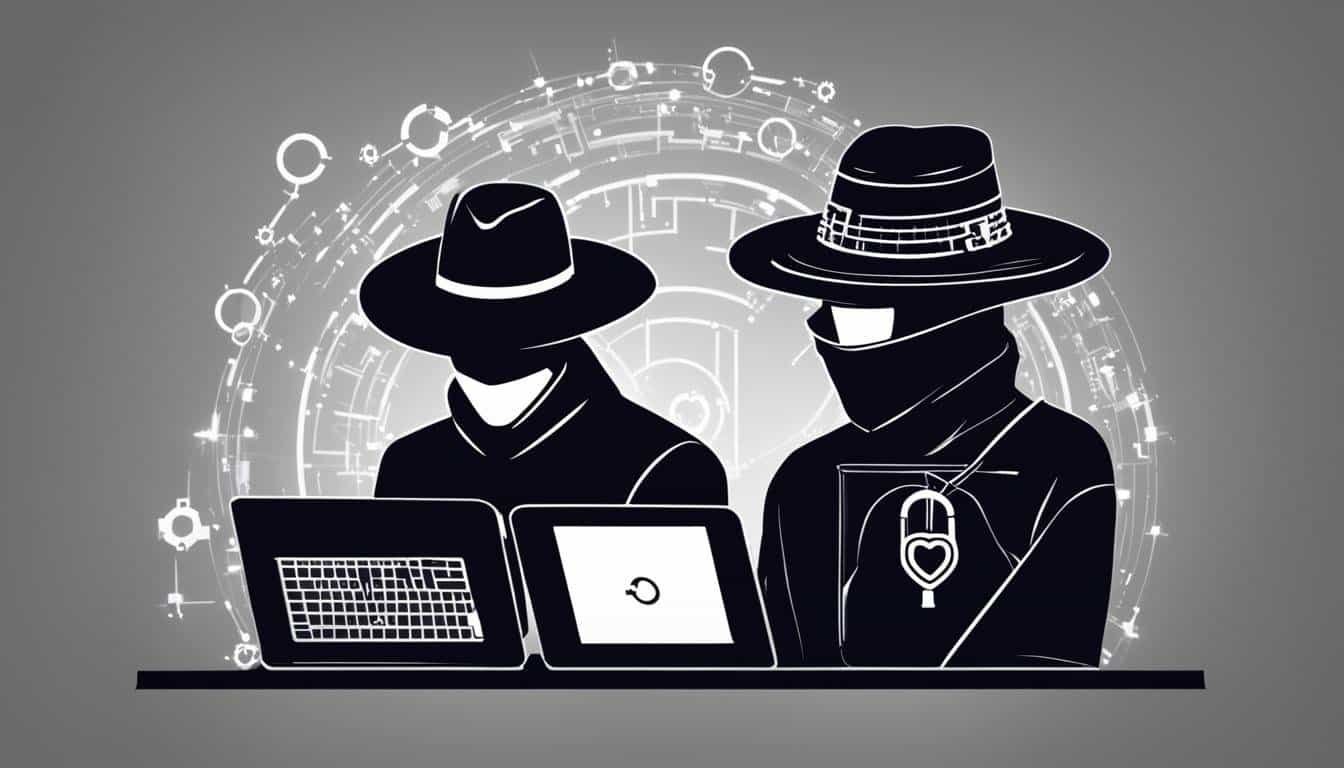Greetings everyone! Today, we embark on an exciting journey to uncover the fascinating world of hacking, specifically focusing on the legal aspects. Allow us to guide you through the intricacies of ethical hacking, legal hacking practices, and the various laws surrounding this captivating subject. Whether you’re curious about hacktivism, white hat hacking, or exploring the realms of hacking for research or defense, we’ve got you covered.
But first, let’s address the elephant in the room – hacking. Often associated with malicious activities, hacking can be a misunderstood term. However, there exists a realm of hacking that falls within the boundaries of legality and serves beneficial purposes. This form of hacking, known as ethical hacking, involves authorized and non-malicious activities carried out with permission and for the greater good of security and defense. So let’s dive in and explore this fascinating world!
Key Takeaways:
- Understanding the legality of hacking practices is essential for navigating the ever-evolving landscape of cybersecurity.
- Ethical hacking allows for the identification and mitigation of vulnerabilities, enhancing the security and defense of organizations.
- White hat hackers play a crucial role in the ethical hacking community, utilizing their skills for the greater good.
- Hacking for research and defense can be conducted within legal boundaries, promoting innovation and safeguarding critical infrastructure.
- Being aware of hacking laws and regulations is vital to ensure compliance and ethical conduct within the hacking community.
The Contemporary “Going Dark” Debate
The debate surrounding government access to encrypted data, often referred to as the “going dark” debate, has become increasingly heated in recent years. Law enforcement authorities argue for the implementation of exceptional access mechanisms on encryption systems to enable effective criminal investigations. On the other hand, industry experts express concerns about the potential security and privacy risks posed by such measures.
Law enforcement authorities advocate for exceptional access mechanisms on encryption systems to ensure access to both data in transit and data at rest. They believe that these mechanisms would provide vital assistance in solving criminal cases. However, industry experts counter that exceptional access mechanisms could weaken encryption, making it more vulnerable to exploitation by malicious actors. This could result in compromised security and privacy for individuals and organizations.
A key argument raised by industry experts is the consideration of alternative methods for investigation, such as lawful hacking. Lawful hacking, also known as government hacking, involves the use of tools and techniques by investigative authorities to gain unauthorized access to computer systems for investigative purposes. Proponents of lawful hacking argue that it can provide valuable information for criminal investigations without the need to compromise encryption. However, concerns about the potential abuse of these tools and the risks of unauthorized access remain.
Law enforcement authorities argue for exceptional access mechanisms to encryption systems, while industry experts raise concerns about the security and privacy risks.
In order to strike a balance between the needs of law enforcement and the concerns of industry experts, further discussion and collaboration are necessary. The development of regulatory frameworks that address the potential risks and limitations of exceptional access mechanisms and lawful hacking is crucial. These frameworks should aim to protect the security and privacy of individuals and organizations, while also enabling effective criminal investigations.
As the “going dark” debate continues, it is essential to consider the broader implications of exceptional access mechanisms and lawful hacking on encryption, security, and privacy. Balancing the needs of law enforcement with the protection of individual rights and the integrity of encryption systems remains a complex challenge that requires ongoing dialogue and collaboration.
Lawful Hacking as an Investigative Tool: Regulatory Challenges
Lawful hacking, also known as government hacking, is a method used by investigative authorities to intrude into computer systems for the purpose of gathering evidence and conducting investigations. While this approach can provide valuable information for criminal cases, it also raises significant security and privacy risks that must be carefully addressed.
One of the key challenges in regulating lawful hacking is conceptualizing the practice itself. It is essential to define what qualifies as lawful hacking and establish clear prerequisites and limitations for its use. This includes determining the specific circumstances under which hacking can be authorized and ensuring that the intrusion is proportionate to the nature of the investigation.
Another important aspect of regulatory approaches to lawful hacking is the development and procurement of hacking tools. These tools must be carefully selected and tested to minimize the potential for unintended consequences and ensure that they are used only for their intended purpose. Additionally, vulnerabilities discovered during the hacking process need to be handled responsibly, with appropriate disclosure mechanisms to prevent their misuse by malicious actors.
Regulatory Approaches
When it comes to regulating lawful hacking, jurisdictions around the world have adopted different approaches. Some countries have established specific laws and guidelines governing the use of government hacking, while others rely on existing legislation related to surveillance and investigative practices.
This table provides an overview of the regulatory approaches to lawful hacking in four countries: Germany, France, Australia, and the United States. It highlights key provisions and considerations, including the scope of authorized hacking, limitations on intrusion, and jurisdictional factors.
By developing comprehensive and carefully crafted regulatory frameworks, countries can better address the challenges associated with lawful hacking. This includes striking a balance between investigative needs and protecting the security and privacy of individuals and organizations.
Country-Specific Approaches to Lawful Hacking Regulation
As the global conversation around lawful hacking regulation intensifies, several countries have begun enacting legal frameworks to address the deployment, limitations, and jurisdictional considerations of this investigative tool. In this section, we will explore the approaches taken by Germany, France, Australia, and the United States in regulating government hacking.
Germany
In Germany, lawful hacking is regulated under the law known as the “Act on the Federal Criminal Police Office’s Ability to Conduct Covert Online Searches.” This law provides the legal basis for investigative authorities to intrude into computer systems with the aim of preventing serious crimes. It includes strict provisions to ensure the proportionality and legality of these hacking activities, with a strong emphasis on safeguarding individual privacy rights and limiting the scope of intrusion.
France
In France, lawful hacking is regulated under the “Intelligence Act,” which grants investigative authorities the power to deploy hacking tools for intelligence purposes. The law establishes a framework for the authorization, oversight, and review of government hacking activities. It also includes provisions to protect fundamental rights, such as privacy and the confidentiality of communications, and requires regular reporting and evaluation of hacking operations.
Australia
In Australia, lawful hacking is regulated under the “Telecommunications and Other Legislation Amendment (Assistance and Access) Act 2018.” This law provides a legal framework for government agencies to request or compel assistance from technology companies in accessing encrypted communications. It includes provisions for oversight, transparency, and safeguards to ensure that hacking activities are conducted lawfully and proportionately.
United States
In the United States, lawful hacking is regulated under various legal authorities, including the Fourth Amendment to the Constitution and the Electronic Communications Privacy Act (ECPA). These laws establish the legal framework for government hacking activities, balancing law enforcement and national security interests with individual privacy rights. The regulation of lawful hacking in the United States involves a complex interplay of judicial decisions, legislation, and agency guidelines.
| Country | Regulatory Framework |
|---|---|
| Germany | Act on the Federal Criminal Police Office’s Ability to Conduct Covert Online Searches |
| France | Intelligence Act |
| Australia | Telecommunications and Other Legislation Amendment (Assistance and Access) Act 2018 |
| United States | Fourth Amendment, Electronic Communications Privacy Act (ECPA) |
Understanding Ethical Hacking

When it comes to safeguarding the security of various systems and networks, ethical hacking plays a crucial role. Also known as white hat hacking, ethical hacking involves authorized access to identify system vulnerabilities and address security flaws. By simulating the methods and activities of malicious hackers, ethical hackers aim to improve the security of organizations and prevent potential data breaches.
Authorized access is a fundamental principle of ethical hacking. Before conducting any security assessments, ethical hackers must seek permission from the organization that owns the system or network. This ensures that their activities are within the legal and ethical boundaries. By maintaining a strong focus on confidentiality, ethical hackers must report any security breaches and vulnerabilities they discover during their assessments. It is also their responsibility to erase any traces of the hack after testing, further emphasizing the importance of maintaining data privacy and security.
“Ethical hacking is like an undercover detective work in the digital world, with the goal of protecting organizations from cyber threats. It requires a unique combination of technical expertise, critical thinking skills, and a strong sense of ethics.”
To effectively carry out their role, ethical hackers require a range of technical skills. This includes proficiency in programming languages, scripting abilities, networking knowledge, and familiarity with different databases. Additionally, ethical hackers must be well-versed in using various hacking tools that assist in identifying and addressing vulnerabilities in systems and networks. These skills enable them to provide valuable insights and recommendations for enhancing the overall security posture of organizations.
By understanding the principles and practices of ethical hacking, organizations can leverage the expertise of skilled individuals to fortify their cybersecurity defenses. Ethical hacking not only helps in identifying potential weaknesses but also offers an opportunity to proactively address these vulnerabilities before they are exploited by malicious actors. As the demand for skilled ethical hackers continues to rise, this field provides promising career opportunities for those passionate about ensuring the security and integrity of digital systems.
Roles and Responsibilities of Ethical Hackers
When it comes to ethical hacking, understanding the roles and responsibilities of ethical hackers is essential. These skilled professionals play a crucial role in ensuring the security and integrity of systems and networks. Let’s take a closer look at the key responsibilities of ethical hackers.
Authorization
First and foremost, ethical hackers must seek authorization from the organization that owns the system or network before conducting any security assessments. This ensures that their actions are within the boundaries of the law and align with the objectives of the organization. Without proper authorization, ethical hacking can easily cross into illegal territory.
Defining Scope
Once authorized, ethical hackers are responsible for defining the scope of their assessment. This includes determining the specific areas, systems, or networks to be tested for vulnerabilities. By clearly defining the scope, ethical hackers can focus their efforts on securing the most critical areas and mitigating potential risks.
Reporting Security Breaches and Vulnerabilities
One of the primary responsibilities of ethical hackers is to identify and report security breaches and vulnerabilities. These professionals use their expertise to identify weaknesses in the system or network and provide detailed reports on their findings. This information is critical for organizations to address the identified issues and strengthen their security measures.
Confidentiality and System Testing
Ethical hackers are entrusted with sensitive information during their assessments. It is their responsibility to maintain strict confidentiality and ensure that any data accessed during the testing remains secure. Additionally, ethical hackers must thoroughly test the system or network, employing a range of techniques and tools to identify potential vulnerabilities and weaknesses.
By fulfilling these roles and responsibilities, ethical hackers contribute to the overall security of organizations and help protect valuable data from malicious attacks. Their expertise and knowledge are invaluable in the ongoing battle against cyber threats.
Skills Required for Ethical Hackers

Being an ethical hacker requires a diverse range of technical skills that enable them to effectively identify and address vulnerabilities in systems and networks. Here are some key skills that are essential for ethical hackers:
- Programming: Ethical hackers need to have a strong understanding of programming languages such as Python, C++, Java, or Ruby. This knowledge allows them to analyze code, identify security flaws, and develop their own tools for penetration testing.
- Scripting: Scripting skills, such as PowerShell or Bash scripting, are crucial for automating tasks and exploiting vulnerabilities. Ethical hackers use scripting to write custom scripts that help them gather information, perform scans, or execute specific actions during penetration tests.
- Networking: A solid understanding of networking protocols, such as TCP/IP, DNS, and DHCP, is essential for ethical hackers. They need to be able to analyze network traffic, identify potential weaknesses, and exploit network-based vulnerabilities.
- Databases: Knowledge of database systems, such as SQL and NoSQL, is important for ethical hackers to identify and exploit vulnerabilities in database-driven applications. This includes understanding database querying, injection attacks, and secure database configuration.
While these skills are fundamental, ethical hackers also need to be familiar with different platforms and operating systems, as vulnerabilities can vary across systems.
“The skills required for ethical hackers go beyond technical knowledge. They also need to possess problem-solving skills, creativity, and the ability to think like a hacker. This mindset allows them to identify unconventional paths and find vulnerabilities that may be overlooked by others.” – John Smith, White Hat Hacker
Expanding the Skill Set
Additionally, ethical hackers should familiarize themselves with a wide range of hacking tools and frameworks that are commonly used in the field. Some popular tools include:
- Metasploit Framework
- Nmap
- Wireshark
- Burp Suite
- John the Ripper
By gaining proficiency in these tools, ethical hackers can enhance their capabilities and perform comprehensive security assessments.
Having a strong foundation in these skills, along with continuous learning and staying updated with the latest security trends, is crucial for ethical hackers to excel in their field and contribute to the protection of valuable data.
| Skill | Description |
|---|---|
| Programming | Strong understanding of programming languages like Python, C++, Java, or Ruby. |
| Scripting | Knowledge of scripting languages like PowerShell or Bash scripting for automation and exploitation. |
| Networking | Familiarity with networking protocols and the ability to analyze network traffic. |
| Databases | Understanding of database systems, such as SQL and NoSQL, and the ability to identify and exploit vulnerabilities. |
Conclusion
As we conclude our exploration of ethical hacking, it is clear that this practice plays a vital role in enhancing cybersecurity and safeguarding sensitive data. With the ever-growing threat of cyber attacks, the demand for skilled ethical hackers is on the rise.
By leveraging their expertise in identifying vulnerabilities, ethical hackers help organizations stay one step ahead of malicious actors. They provide a crucial defense against data breaches and strive to ensure the integrity and security of digital systems.
The field of ethical hacking offers promising career opportunities for individuals with the right skills and certifications. As organizations continue to prioritize cybersecurity, the need for ethical hackers is expected to increase. This presents an exciting path for those passionate about information security, with a chance to make a meaningful impact in protecting valuable data.
Join us in the dynamic world of ethical hacking and become a defender of cybersecurity.
Are All Hacking Forums Illegal or Are There Legal Ones as Well?
When it comes to hacking forums legality explored, it’s important to understand that not all forums are illegal. While some platforms promote illegal activities, there are also legal hacking forums available. These legitimate forums serve as a platform for ethical hackers to share knowledge, discuss cybersecurity, and explore vulnerabilities to improve overall online safety.
Is Watching .hack Legal in the US?
Wondering if watching .hack is legal in the US? Don’t worry, we’ve got the ultimate guide to deciding which hack to watch. Rest assured, watching .hack in the US is completely legal as long as you are accessing it through authorized platforms. So go ahead and dive into the mesmerizing world of .
FAQ
What is ethical hacking?
Ethical hacking is the authorized practice of identifying vulnerabilities in a system or network by bypassing security measures. It is also known as white hat hacking and aims to improve the security of organizations by detecting and addressing potential data breaches and threats.
How do ethical hackers contribute to cybersecurity?
Ethical hackers play a crucial role in improving cybersecurity by identifying and addressing vulnerabilities in systems and networks. Their work helps prevent data breaches and enhances the overall security of organizations.
What are the responsibilities of ethical hackers?
Ethical hackers must seek authorization from the organization that owns the system or network before performing any security assessments. They are responsible for defining the scope of their assessment, reporting security breaches and vulnerabilities, maintaining confidentiality, and erasing any traces of the hack after testing.
What skills are required for ethical hackers?
Ethical hackers require a range of technical skills, including programming knowledge, scripting abilities, networking skills, database proficiency, familiarity with different platforms, and proficiency in using hacking tools.
Is ethical hacking a growing field?
Yes, ethical hacking is a growing field with high demand for skilled professionals. With the right skills and certifications, ethical hackers can have promising career opportunities in information security.




0 Comments